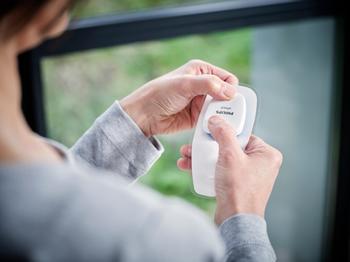Check your blood pressure
Measuring blood pressure is a fundamental and important part of monitoring and understanding your health. By keeping track of your blood pressure, you can detect and prevent potential health problems early. Over 1.7 million Swedes suffer from high blood pressure. From the age of 20 and up, around one in four people has high blood pressure. From the age of 60 and above, almost every other person has high blood pressure. Half of all people with high blood pressure do not know it because high blood pressure does not always cause any symptoms. The symptoms often only become apparent with very high blood pressure. Many only discover after treatment that their fatigue or headache was linked to their blood pressure.
Despite clear treatment goals, only half of people with high blood pressure reach recommended levels, even though blood pressure medication is one of the most life-saving medical treatments. Blood pressure measurement is ideal for you who want to check whether you have high, low or normal blood pressure. It is a simple and effective method for monitoring the effect of ongoing blood pressure treatment but also as a supplement when analyzing your blood values.
Blood pressure is an important supplement when analyzing blood samples
Including blood pressure measurement when analyzing other blood samples gives a more complete picture of your health. Blood pressure is a central factor in assessing cardiovascular risk and can provide important information that complements results from other blood tests. Here are some reasons why blood pressure measurement is a valuable adjunct:
- Cardiovascular health: Blood pressure measurement together with cholesterol and blood sugar tests provide a comprehensive picture of your cardiovascular health. This helps identify risk factors for heart attack and stroke.
- Monitoring treatment effects: If you are being treated for high cholesterol or diabetes, regular blood pressure checks can show how well your treatment is working and whether further measures are needed.
- Early warnings: Combined results from blood pressure measurement and other blood tests can detect early abnormalities that can lead to serious health problems, providing the opportunity for preventive measures.
What is a normal blood pressure?
A normal blood pressure for both men and women lies between 120-130 mmHg in overpressure (systolic pressure) and 80-85 mmHg in underpressure (diastolic pressure). Blood pressure between 130-140 mmHg above 85-89 mmHg is considered "elevated normal pressure" and should be monitored. If blood pressure exceeds 140/90 mmHg, it is classified as hypertension. To treat elevated blood pressure, lifestyle changes such as improved diet and increased physical activity are often recommended, but medical treatment may be necessary at excessively high levels.
Understanding your blood pressure
Blood pressure measurement measures the load on your blood vessels with each heartbeat, indicated as over and under pressure, for example 120/80 mmHg. The unit mmHg stands for millimeters of mercury, a standard in healthcare.
High blood pressure (Hypertension): Normal values for blood pressure are between 100-140/60-90 mmHg. Values above this indicate hypertension, which may be due to lifestyle, heredity or medical factors. Common causes include obesity, poor fitness, stress, smoking, high salt, caffeine and alcohol intake, diabetes and kidney disease. Some medicines can also raise blood pressure.
Symptoms: Common symptoms of high blood pressure are headache, fatigue, nausea and shortness of breath. If high blood pressure is left untreated, it can lead to serious cardiovascular diseases such as stroke and heart attack, as well as other complications such as kidney disease and dementia.
Low blood pressure (Hypotonia): Blood pressure below 90/60 mmHg is considered low, especially if accompanied by symptoms. Low blood pressure is usually harmless and rarely requires treatment, but can lead to a drop in blood pressure.
Symptoms: With low blood pressure, you may feel dizzy, faint, cold sweat or experience heart palpitations.
Preparations for blood pressure measurement
To ensure your blood pressure is measured correctly, follow these guidelines:
- Avoid stress and physical exertion before the measurement.
- Rest for at least 5-10 minutes in place before the measurement.
- Avoid consuming coffee, tea or other caffeinated drinks/tablets before the measurement.
- Abstain from tobacco and intense physical activity just before the measurement.
Why blood pressure measurement is good
- Prevents serious heart diseases: Regular checks can prevent heart attacks and strokes.
- Monitors your health: Helps you keep track of the effects of lifestyle changes and medication.
- Early Warning System: Identifies potential health problems before they become serious.
Therefore should check your blood pressure
Regularly measuring your blood pressure helps you detect any abnormalities early, which can prevent the development of serious cardiovascular diseases. By keeping track of your blood pressure, you can effectively monitor how your medication and lifestyle changes affect your health. This makes it possible to take the necessary measures in time and thus minimize the risk of complications. A blood pressure measurement is a simple but powerful method of ensuring you live a long and healthy life.




























